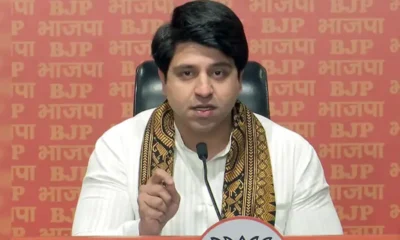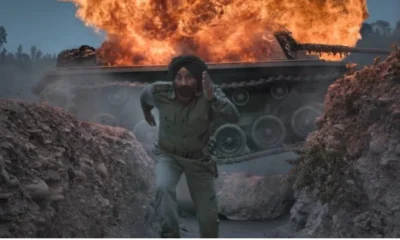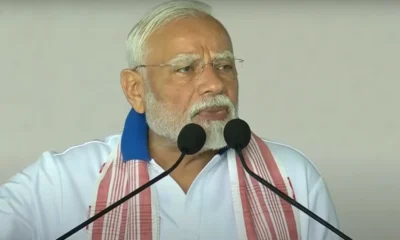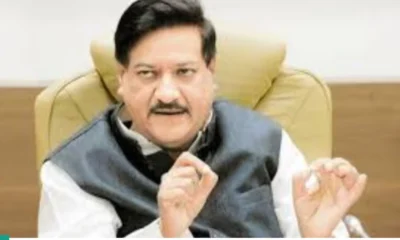[vc_row][vc_column][vc_column_text]While Prime Minister Narendra Modi, his party and other ardent followers have never stopped taking credit for PM’s boldness and bravery for the surgical strikes Indian troops carried out on terror launch pads across the Line of Control in the wake of the Uri attack in 2016, a retired army officer who oversaw the operation has criticised the hype and the attempt to gain political mileage out of it.
Lt General (retired) DS Hooda, who was the Northern Army Commander in September 2016 and oversaw the Indian army’s surgical strikes, said too much of hype over the operation did not help and it is not good when army operations get politicised, reported The India Express (IE).
According to a report in The Hindustan Times, he said: “The military leadership must guard against becoming a tool in the hands of politicians. We can’t take military action to suit someone politically.” He added that though the action needed publicity to boost soldiers’ morale, the excess hype and political one-upmanship around it was uncalled for.
The veteran was moderating a session on the “Role of cross-border operations and surgical strikes” on Day 1 of the Military Literature Festival organised by the Punjab government at Lake Club in Chandigarh on Friday.
Hooda said following the surgical strikes, there were accusations that the issue had been politicised, that there was an “attempt to keep a purely military operation in the political domain by selective leaks of videos, photographs etc”.
“Did the overhype help? I say, completely no. If you start having political resonance in military operations, it is not good. There was too much political banter, on both sides, and when military operations get politicised, that is not good,” he said. On the possibility of the strikes impacting the thought process of decision-makers in future operations, the former Army Commander said “if you hype a successful operation, then even success has its burden”.
“Will we think next time (what) if there are casualties? Because it has been so overhyped, will it impose caution on leadership? What happens if it does not have the same level of success? It may impose some caution in future. If we had done it quietly, it would have been much better,” he said.[/vc_column_text][/vc_column][/vc_row][vc_row][vc_column][vc_column_text css=”.vc_custom_1544274175251{border-top-width: 10px !important;border-right-width: 10px !important;border-bottom-width: 10px !important;border-left-width: 10px !important;padding-top: 10px !important;padding-right: 10px !important;padding-bottom: 10px !important;padding-left: 10px !important;background-color: #bcbcbc !important;border-radius: 10px !important;}”]Army Chief General Bipin Rawat on Saturday said that he respects the view of Lt General DS Hooda (retd) on surgical strikes being over hyped as Hooda was a part of the operation.
“These are individual person’s perceptions so let’s not comment on them. He was one of the main persons involved in conduct of these operations so I respect his words very much,” said Rawat.
[/vc_column_text][/vc_column][/vc_row][vc_row][vc_column][vc_column_text]Responding to remarks from panelists that the strikes were purely tactical in nature with short-term goals and of no strategic value to deter the Pakistan Army from backing future terror attacks, Hooda said: “When we were planning it, there was no thought in our mind that Pakistan will stop doing Uri-like incidents. At least in the Northern Command, there was simplicity of purpose. For us, it was very simple,” he said.
He said ever since 2013-end, terrorists had been coming from across the LoC to attack Army installations in Samba, Hiranagar, Janglote, Pathankot and Uri. “Since July 2016, Army had been under pressure due to protests following (militant commander) Burhan Wani’s death. The Chief of Army Staff flew in and we went to Uri. We walked in three-inch-deep ashes of the camp which had been attacked. There was no doubt in our mind that we had to do something and we had to hit Pakistan camps across the LoC. You may call it revenge but in our mind, this had to be done,” he said.
The aim of the strikes, he said, could not have been fulfilled through artillery fire. “We had had massive artillery duels but it was not helping. Planning had been going on in advance. We pulled out our old plans, refurbished them a bit and sent the Special Forces across. Should it have been publicised? There was no option. Too many questions were being asked. The media and our own Army soldiers were asking, ‘what are we doing about so many deaths of soldiers’,” he said.
He said following the surgical strikes, the Army noted a “fair amount of panic” on the Pakistani side. “Their leaves were cancelled. We caught their chatter on radio. There was talk that we might repeat it in some area. There was fair amount of shock on their part as to how have these guys come in and done this operation. This did impose caution on them in some limited sense,” he said.
Responding to a question from the audience, Hooda said in hindsight, it would have been better had the strikes been done secretly.
He also added that it was not that the directions to carry strike came from the political bosses. “It was purely a military decision,” he added.
“It was natural to have initial euphoria about the success but the constant maintenance of hype around the military operations was unwarranted. It should have been kept quiet,” Hooda concluded.
Some of the noted veterans who were part of the panel discussion, also questioned the publicity given to the surgical strike saying that glorification of the military operation was unwarranted, as it could not serve any major tactical or strategic purpose.
Other officers agreed with Gen Hooda
Veterans were also of the view that the much touted surgical strikes had failed to deter Pakistan, which was continuously infiltrating on Indian soil even after that.
Noted military veteran, Lt Gen NS Brar (retd), who had also served as member of the Armed Forces Tribunal (AFT), even cautioned the Centre asking, “Whether the political head would have owned the responsibility had there been causalities in the surgical strike.” He said that it was difficult to assume that the September 2016 strikes forced the Pakistan to change or review their policy.
Gen Brar added that in future there was need to have long term impact on the enemy while conducting such operation. He gave an example of air strikes carried out by Israel in 1981, on Iraq’s nuclear sites causing huge damage.
Former Deputy Chief of the Army Staff (DCAS) Lt Gen JS Cheema (retd) said that it was too simplistic to assume that Pakistan would rethink its course of action against India after the much advertised surgical strikes. He, however, said that the operation was successful and had boosted the morale of troops.
Another noted veteran and an expert on defence and strategic issues, Col Ajay Shukla (retd) said that there was nothing new in the surgical strike, as this is a way of life for the troops at the Line of Control. He added that the excessive publicity of the September 2016 strikes, which had in fact been a reactionary strike conducted after the Pathankot and Uri attacks, had set a dangerous benchmark for the Indian political dispensation, which they would find difficult to maintain in the eventuality of future terror attacks.
“Success has its burden, Pakistan had in fact been emboldened by the strikes as they knew now that the Indian government would be always be under immense pressure to strike across the border after each terror attack,” Col Shukla added.
The event was attended by Punjab governor VP Singh Badnore and former Army chief, General VP Malik amongst a battery of former generals and Army commanders.[/vc_column_text][/vc_column][/vc_row]


 India News22 hours ago
India News22 hours ago
 India News21 hours ago
India News21 hours ago
 Latest world news21 hours ago
Latest world news21 hours ago
 Entertainment18 hours ago
Entertainment18 hours ago
 India News22 hours ago
India News22 hours ago
 India News15 hours ago
India News15 hours ago
 India News12 hours ago
India News12 hours ago















